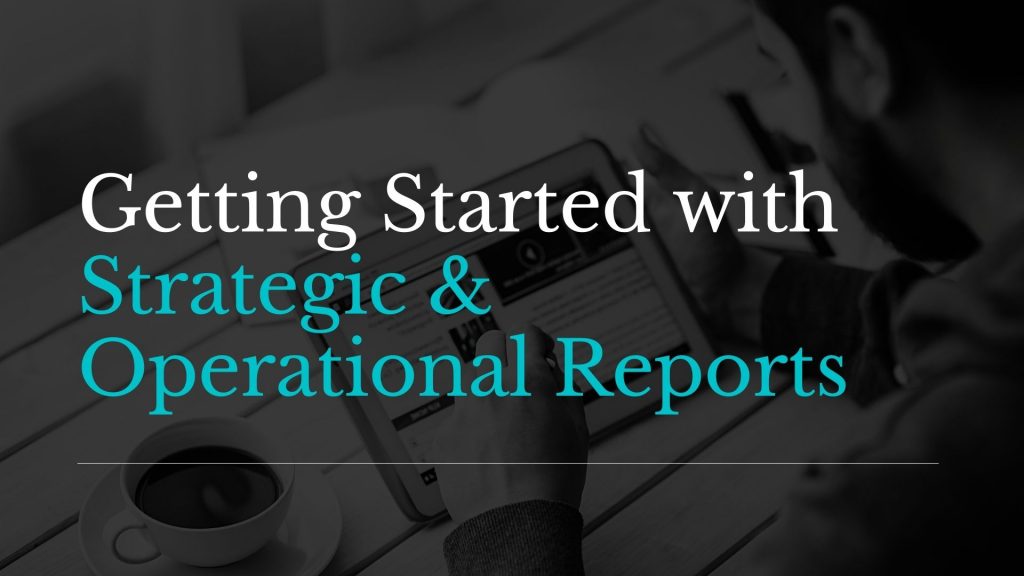
In the Age of Information, a business can accelerate its success by harnessing its organizational data in a way that is both efficient and value-driven.
To squeeze every last drop of value from your data, both in an operational and strategic sense, it’s important to leverage the right online reporting tool. When it comes to reporting (on both a daily, weekly, and monthly basis), the plans and methods you formulate to optimize your organization will steer your long-term success.
To guide your business to operations reporting success, we are going to explore operational and strategic reporting. Here, we will consider the question ‘What are operational reports,’ delve deeper into strategic reports, and examine a host of best operational reporting analysis practices.
What Is Operational Reporting?
Operational reporting is an effective, results-driven means of tracking, measuring, and analyzing a business’s regular deliverables and metrics, usually on a daily, weekly, and sometimes monthly basis with the help of modern and professional BI reporting tools.
Serving low-level operational data, oftentimes in a shorter time frame, operations reports offer invaluable insights into various logistical aspects relating to an organization’s activities across the board. By gaining access to highly visual interactive insights, you can:
- Make swift, informed decisions, often in real-time
- Save time and money by improving efficiency in a number of key operational areas – departments as well as industries
- Spot emerging trends and formulate initiatives that will improve the day-to-day running of the business
- Foster internal cohesion and create an exponentially more operational internal infrastructure to ensure stable growth
When To Use Operational Reports?
Now that you’re up to speed with the fundamental concepts of operational reports, we’re going to consider when to use an operations report.
In terms of data analysis, you should use operational reports to track, benchmark, and improve your processes, as well as performance, in ongoing operational areas of the business. These areas include functions such as warehousing & fulfillment, manufacturing efficiency, and real-time (or short-term) marketing or sales campaign trends or results.
When you’re working with an operation report, it’s important to consider why you’re using it based on the outcomes and objectives you’re looking to achieve. By doing so, you’ll be able to understand precisely when operational reporting will offer your business the most value.
By working with professional business dashboards containing a cohesive mix of real-time or daily insights as well as weekly and monthly data, you will streamline your operational performance across the board while improving internal communications significantly. In that sense, you should probably ask yourself the question, “When shouldn’t I use operational reporting tools?”
a) Real-time operational reporting
Real-time analytics serve up operational data at the moment. By accessing a mix of visualizations that provide insights as they happen, managers or operatives across departments can respond to trends as they unfold. In doing so, it’s possible to make informed decisions concerning issue management, departmental performance, and short-term operational strategy. Ultimately, real-time analytics makes businesses responsive, adaptable, and communicative, resulting in improved organizational output as well as profitability.
b) Monthly operational reporting
When it comes to reporting in business intelligence, analyzing your monthly activities is essential. By working with a monthly report, it’s possible to create a sense of fluency and cohesion throughout the business by looking at metrics aimed at the midterm. If you’re an agency, you can also create a client dashboard and send it as a report each month to update stakeholders on relevant data. An integral part of any well-rounded organizational report strategy, a monthly report presents a valuable mix of trend-based data that facilitates short-term decision-making as well as long-term initiative formulation. Monthly operational reporting data is informative, detailed, and balanced, making these types of reports essential to the ongoing success of any organization.
Here is how we at Cintel.io can help you:
As the organizations keep growing and expanding, the significance of these operational reports increases. These provide a time to time picture of the entire organization or division and help the leaders track their performance. Be it any industry or domain, operational reporting is imperative to stay on top of all the processes and get a concise yet complete view. With the emergence and wide acceptance of BI, operational reporting is bound to make positive change across the hierarchy and horizontally too.